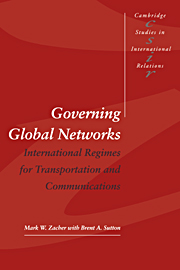Book contents
- Frontmatter
- Contents
- Preface
- Acknowledgments
- 1 International regimes and global networks
- 2 Mutual interests and international regime theory
- 3 The international shipping regime
- 4 The international air transport regime
- 5 The international telecommunications regime
- 6 The international postal regime
- 7 Normative continuities and international regime theory
- Notes
- Index
- Titles in the series
1 - International regimes and global networks
Published online by Cambridge University Press: 27 August 2009
- Frontmatter
- Contents
- Preface
- Acknowledgments
- 1 International regimes and global networks
- 2 Mutual interests and international regime theory
- 3 The international shipping regime
- 4 The international air transport regime
- 5 The international telecommunications regime
- 6 The international postal regime
- 7 Normative continuities and international regime theory
- Notes
- Index
- Titles in the series
Summary
It is clear to most observers of world politics that there is a great deal of order in international relations as well as conflict and disorder. A central issue for the scholar is to understand why there are orderly relations and regimes in some issue areas and not in others. One answer to the query is that regimes evolve quite simply when the most powerful state or states believe that particular regulatory arrangements would promote their interests. It is an answer that appeals to those who view the international politics of our century as having been shaped by the strength, and especially the military strength, of the great powers. They view it as naive and inherently harmful to think that the interests and power of the major states do not establish the fundamental parameters of international relations. Statesmanship in the eyes of individuals with such a perspective is about the great powers understanding what strategies and tactics will best promote their interests — particularly military security — and the large number of weaker states managing their relations with the stronger states in order to survive and prosper.
This is an inaccurate portrayal of the politics of international cooperation. There are too many international regimes that all or most states regard as in their interests to accept the above perspective.
- Type
- Chapter
- Information
- Governing Global NetworksInternational Regimes for Transportation and Communications, pp. 1 - 12Publisher: Cambridge University PressPrint publication year: 1995
- 1
- Cited by



